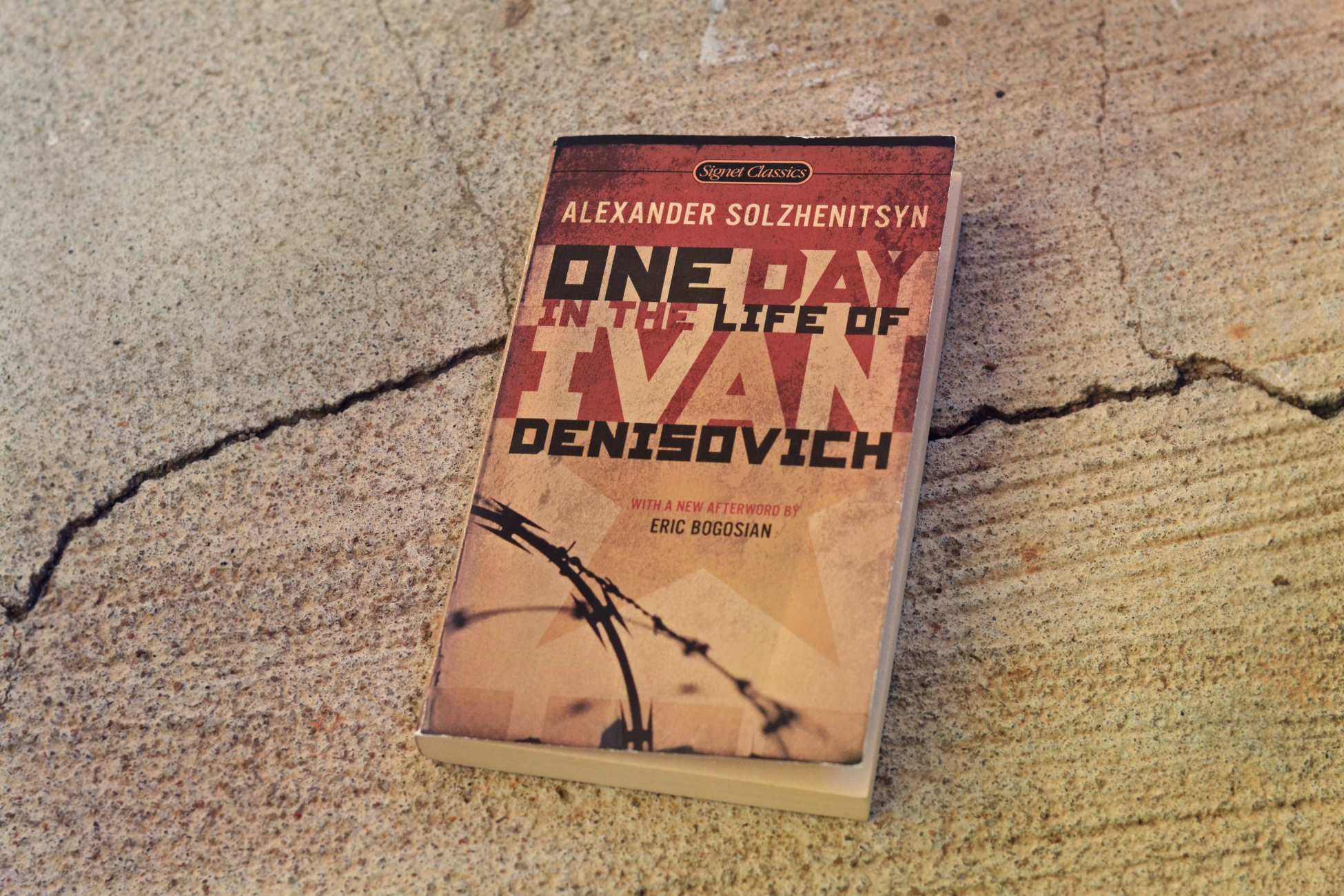
Aleksandr Solzhenitsyn’s masterpiece, “One Day in the Life of Ivan Denisovich,” takes readers on a gripping journey through the life of a Soviet prisoner in a labor camp during the harsh years of Joseph Stalin’s reign. This compelling novella provides a raw and unflinching portrayal of the struggles, sorrows, and small victories that define one day in the life of Ivan Denisovich. Solzhenitsyn’s powerful storytelling not only exposes the brutal realities of life in a gulag but also delves into the indomitable human spirit, resilience, and the search for meaning in the face of adversity.
Key Takeaways:
- “One Day in the Life of Ivan Denisovich” sheds light on the harsh realities of Soviet labor camps, showcasing the resilience of the human spirit amidst adversity. It continues to inspire readers worldwide.
- Written by Nobel Prize-winning author Aleksandr Solzhenitsyn, the novel offers a powerful portrayal of the psychological toll of imprisonment and serves as a scathing critique of the oppressive Soviet regime.
Written by Aleksandr Solzhenitsyn, a Nobel Prize-winning author
Aleksandr Solzhenitsyn, known for his powerful portrayal of Soviet life, penned this masterpiece. His incredible storytelling and attention to detail make “One Day in the Life of Ivan Denisovich” a compelling read.
Published during the Soviet era
The novel was published in 1962, when Soviet censorship was strict. Despite facing criticism, Solzhenitsyn’s work managed to highlight the hardships faced by prisoners in a Soviet labor camp.
Based on the author’s own experience
Solzhenitsyn’s own firsthand experience as a political prisoner in the Soviet Union inspired the novel. He spent several years in labor camps, which lends authenticity and depth to the story.
Unveils the harsh realities of Soviet labor camps
“One Day in the Life of Ivan Denisovich” provides a chilling insight into the brutal conditions endured by prisoners. It exposes the inhumane treatment, forced labor, and constant surveillance that characterized Soviet gulags.
The story takes place in a single day
Spanning from morning to night, the novel captures a 24-hour period in the life of Ivan Denisovich Shukhov, a prisoner in a Soviet labor camp. This unique narrative structure adds a sense of urgency and intensifies the reader’s connection to the protagonist.
Portrays the banalities and triumphs of life in a labor camp
The novel explores the mundane routines and small victories that prisoners cling to amidst the harsh conditions. Solzhenitsyn’s vivid descriptions bring to life the grim reality while highlighting the resilience of the human spirit.
Shed light on the psychological effects of incarceration
The psychological toll of imprisonment is a central theme in the novel. Solzhenitsyn delves into the mental struggles, resilience, and desperation faced by the characters, offering a profound exploration of the human psyche.
Initially written for personal storage
Solzhenitsyn initially wrote the novel as a way to document his experiences, with no intention of publishing it. However, he managed to smuggle the manuscript out of the labor camp, leading to its eventual publication.
Faced controversy and censorship in the Soviet Union
Due to its honest portrayal of Soviet labor camps, the novel faced criticism and censorship from the Soviet authorities. However, it gained international acclaim and became a symbol of resistance against totalitarianism.
Revolutionary in its portrayal of Soviet society
“One Day in the Life of Ivan Denisovich” broke new ground by shedding light on the dark aspects of Soviet society. It exposed the flaws of the Soviet system and contributed to the drive for political and social change in the country.
Highly influential in Soviet dissident literature
The novel played a significant role in the development of dissident literature in the Soviet Union. It inspired other writers to challenge the state’s control over artistic expression and contributed to the blossoming of underground literary movements.
Translated into numerous languages
“One Day in the Life of Ivan Denisovich” has been widely translated and published in numerous languages across the globe. Its powerful message and universal themes have resonated with readers from different cultures and backgrounds.
Adapted into a critically acclaimed film
The novel was adapted into a movie in 1970, directed by Caspar Wrede. The film received widespread acclaim for its faithful adaptation and further brought the story to a wider audience.
Explores themes of human dignity and survival
The novel delves into the themes of human dignity, resilience, and the will to survive against all odds. It serves as a powerful reminder of the indomitable nature of the human spirit, even in the face of extreme adversity.
Garnered critical acclaim and awards
“One Day in the Life of Ivan Denisovich” received high praise from critics and readers alike. It earned Solzhenitsyn numerous awards and nominations, further solidifying its status as a literary masterpiece.
An important part of Russian literature
The novel holds a significant place in Russian literature, not only for its artistic merit but also for its impact on social and political discussions. It continues to be studied and analyzed in academic settings worldwide.
A powerful indictment of the Soviet regime
“One Day in the Life of Ivan Denisovich” serves as a scathing critique of the oppressive Soviet regime. It exposes the injustices, corruption, and hypocrisy prevalent in the Soviet system, sparking widespread debate and reflection.
Continues to resonate with readers today
Decades after its publication, “One Day in the Life of Ivan Denisovich” remains relevant and impactful. Its themes of human suffering, resilience, and the struggle for freedom transcend time and resonate with readers of all generations.
Conclusion
In conclusion, “One Day in the Life of Ivan Denisovich” by Aleksandr Solzhenitsyn is a powerful and thought-provoking novel that provides a glimpse into the harsh realities of life in a Soviet labor camp. Through the meticulously detailed account of one day in Ivan Denisovich’s life, Solzhenitsyn sheds light on the dehumanizing conditions, the struggle for survival, and the indomitable spirit of the human soul.
The novel serves as a stark reminder of the atrocities committed during the Stalinist era and a testament to the resilience of the human spirit in the face of extreme adversity. Solzhenitsyn’s literary masterpiece continues to captivate readers with its powerful storytelling and profound exploration of themes such as freedom, dignity, and the search for meaning in the most challenging circumstances.
With its enduring relevance, “One Day in the Life of Ivan Denisovich” stands as a literary masterpiece that reminds us of the importance of preserving our humanity and striving for a more just and compassionate society.
FAQs
Q: Is “One Day in the Life of Ivan Denisovich” based on a true story?
A: While the novel is a work of fiction, it draws heavily from Aleksandr Solzhenitsyn’s own experiences as a political prisoner in a Soviet labor camp.
Q: How long does it take to read “One Day in the Life of Ivan Denisovich”?
A: The novel is relatively short, typically taking about 2-3 hours to read.
Q: What is the significance of the title?
A: The title represents the confined and monotonous existence of Ivan Denisovich, capturing the essence of his entire life defined by a single day in the labor camp.
Q: What are the major themes in the novel?
A: The major themes in “One Day in the Life of Ivan Denisovich” include the struggle for survival, the dehumanization of the individual, the quest for dignity, and the power of the human spirit to endure and find meaning in the most challenging circumstances.
Q: Has the novel received any awards or recognition?
A: Yes, “One Day in the Life of Ivan Denisovich” received international acclaim and catapulted Aleksandr Solzhenitsyn to literary fame. It was awarded the Nobel Prize in Literature in 1970.
If you're fascinated by the world of Soviet-era literature and history, don't miss our captivating articles on Aleksandr Solzhenitsyn's groundbreaking work, "The Gulag Archipelago," which exposes the horrors of Soviet prison camps. For a deeper dive into Soviet history, check out our mind-blowing facts about Nikita Khrushchev, one of the most influential leaders of the Soviet Union. And if you're curious about the dark side of the Stalinist era, our article on Lavrentiy Beria, the notorious head of the Soviet secret police, is a must-read.
Was this page helpful?
Our commitment to delivering trustworthy and engaging content is at the heart of what we do. Each fact on our site is contributed by real users like you, bringing a wealth of diverse insights and information. To ensure the highest standards of accuracy and reliability, our dedicated editors meticulously review each submission. This process guarantees that the facts we share are not only fascinating but also credible. Trust in our commitment to quality and authenticity as you explore and learn with us.


